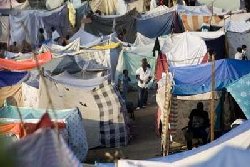The prime minister of Haiti has said that his country needs at least five to 10 years of reconstruction help after its people were "bloodied, martyred and ruined" by the devastating earthquake this month.
Jean-Max Bellerive said on Monday at an international aid conference that "the people of Haiti will need more and more and more in order to complete the reconstruction".
The conference in the Canadian city of Montreal was not intended to bring specific aid promises but to assess immediate needs and begin charting Haiti's long-term recovery from the January 12 earthquake.
The group said it would hold an international pledging conference at the UN headquarters in New York in March.
Bellerive said efforts to rebuild Haiti must be led from inside the country, rather than by foreign governments or aid organizations.
"Haitians continue to work in precarious conditions but it is in the position to assume the leadership expected of it by its people in order to prelaunch the country on the path to reconstruction," he said.
'Overwhelmed'
Haiti's government says at least 150,000 people were killed and many tens of thousands more made homeless by the 7.0 magnitude quake that left much of the capital Port-au-Prince in ruins.
Bellerive said Rene Preval, the president, had called him to press for an additional 200,000 tents for people who lost their homes.
But John Holmes, the UN emergency relief coordinator, said stronger temporary structures would be needed for Haiti to face the start of the rainy season in April and hurricanes in June.
"Tents, while the only shelter solution available quickly enough now, will not be much good for these purposes," he said.
Josue Andre from the Peasants Association of Fondwa grass roots development organization, told Al Jazeera that Haitians were "really overwhelmed by the situation".
"We are in need of medicines, water, tents, and food," he said.
"But we also need psychological help. The people's minds were really attacked by what happened, and it was something no one expected."
A key theme that emerged at the Montreal conference on Monday was the need to ensure development and population were not so concentrated in Port-au-Prince, which sits right on a fault line.
"In 30 seconds, Haiti lost 60 per cent of its GDP [gross domestic product]," Bellerive said, referring to economic focus on the capital. "So we must decentralize."
Clashes
More than 100,000 people have already left the streets and crowded tent cities of Port-au-Prince to find refuge elsewhere in the country, and the Haitian authorities are encouraging the exodus, offering free bus rides to take them to the southwest and north.
But many more remain in the shattered capital where clashes broke out on Monday between local residents clamoring for supplies and UN peacekeepers attempting to distribute the aid.
The crowd of hundreds at a food distribution site in front of Haiti's demolished presidential palace pressed forward as people were being chosen in pairs by UN staff members to go forward to get food and water.
Firing their guns into the air, the UN troops attempted to quell the melee, but were unable to hold the crowd back when it surged forward and took over the truck which held the supplies.
PHOTO CAPTION
Haitians live in a makeshift camp at a golf course in Port-au-Prince, Haiti January 24, 2010.
Al-Jazeera


 Home
Home Discover Islam
Discover Islam Quran Recitations
Quran Recitations Lectures
Lectures
 Fatwa
Fatwa Articles
Articles Fiqh
Fiqh E-Books
E-Books Boys & Girls
Boys & Girls  Ramadan
Ramadan Fatwa Audios
Fatwa Audios Month of Mercy
Month of Mercy Women
Women Eed Al- Fitr
Eed Al- Fitr Food Recipes
Food Recipes Videos
Videos

 Prayer Times
Prayer Times












